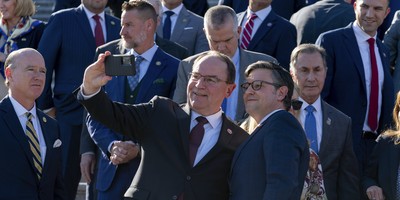History changes -- historians make sure it does. Historians re-evaluate the past in the light of new events. That's the past reinterpreted, or history renewed. Strategists --and the best are well-grounded in history -- attempt to leverage history and an estimate of current conditions to speculate on "pending changes." In other words, the future.
Two books published this year admirably reflect history renewed and history pending -- Jonathan Reed Winkler's "Nexus: Strategic Communication and American Security in WWI" (Harvard) and Thomas M. Nichols' "Eve of Destruction: The Coming Age of Preventive War" (University of Pennsylvania Press).
Put both books on Barack Obama's Christmas reading lists -- put them in the stocking marked "Strategic Guidance Regarding Change."
Winkler's book provides a lesson in the evolutionary nature of technological change. Winkler explores the first global Internet -- the international telegraph cable system that began shrinking Planet Earth at the end of the 19th century.
Winkler illustrates that the "new" is rarely a radical break with the past. Undersea cables broke the great silence of strategic distance, establishing the first near-instantaneous global communications network. The hackers on this Internet literally hacked cables.
As the 20th century dawned, Britain emerged as the global information power. "The world's cable industry was almost entirely in British hands," Winkler writes. Britain had the cable-laying ships and controlled production of gutta-percha, the "latex wrap" for insulating long-distance cable. Britain had a lead in wireless radio -- the next-wave global link. Moreover, Britain had encouraged "countries to land their cables in Britain and overseas colonies ... ensuring ... their communications came under British control in wartime."
Recommended
When World War I erupted, the British "hacked" German cables and intercepted both cable and wireless traffic. This produced an intelligence edge and gave Britain imposing economic and political advantages. U.S. international traders remained at the mercy of the British cable and wireless companies -- and got a harsh lesson in "the information economy." British dominance distantly echoes current U.S. Internet dominance.
Tom Nichols teaches at the U.S. Naval War College. "Eve of Destruction" is not a Beltway clerk's wonk tome about how fine the world would be if people with multi-syllabic vocabularies and the right friends were running it. This is a warfighter's book written by someone prepared to deal with 9-11, Mumbai and the next terrorist horror.
Nichols argues the "previous pillars" of order -- tradition, international law, "concrete deterrence" -- can "no longer promise" protection. The Westphalian idea of "absolute" state sovereignty is over (think Kosovo), and institutions "founded upon it" (e.g., the United Nations) are "in transition." Al-Qaida-type terrorists nix the "logic" of Cold War-type deterrence, and terrorist weapons of mass destruction make the risk of a misjudgment too great. These concerns have furrowed brows for the better part of two decades, but Nichols' focus on the "burden of action" and consequences of inaction frame the discussion -- a "grimness" the author acknowledges.
Nichols sees three choices: First, "continue to pretend the status quo is viable ..." (denial) or, second, great powers will "grant to each other the exceptional right to use violence as they will" ("global jungle" choice). Option two produces a system where small nations face "a system based on coercion rather than comity" (think Russia and Georgia). Nichols' tentative third choice is reforming international institutions, beginning with the United Nations. He favors a "Community of Democracies" (something like John McCain advocated) but considers other reforms. For example, membership in the General Assembly "derives" from simple existence, but Security Council membership is "a privilege earned by a state's behavior, both internal and external."
Will his reforms foster comity? I'm not so sure, but Nichols makes the case the age of preventive war has already begun. "We don't have to like that fact," he writes, "but we do have to deal with it."
Nichols' "burden of action" now falls on Barack Obama.

























Join the conversation as a VIP Member